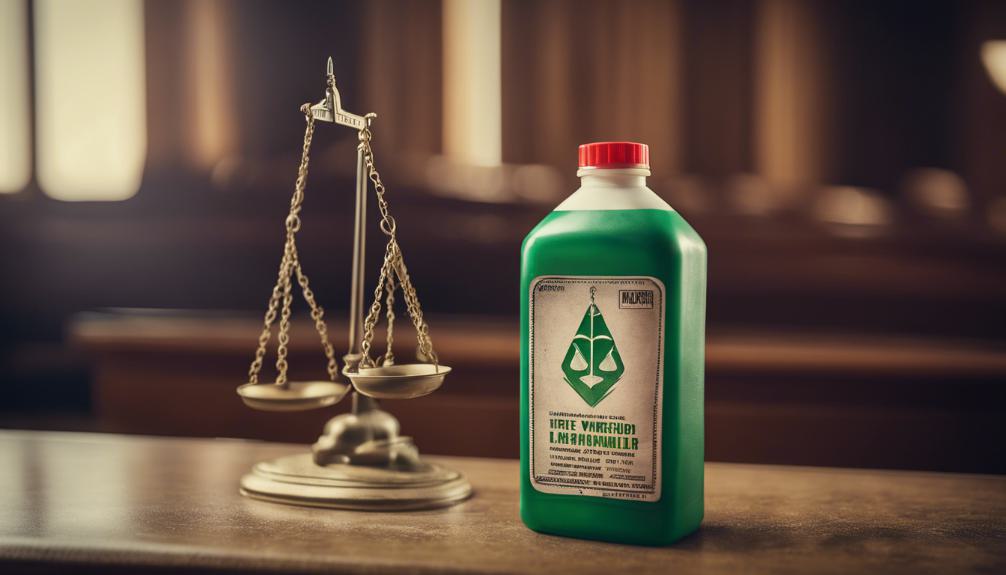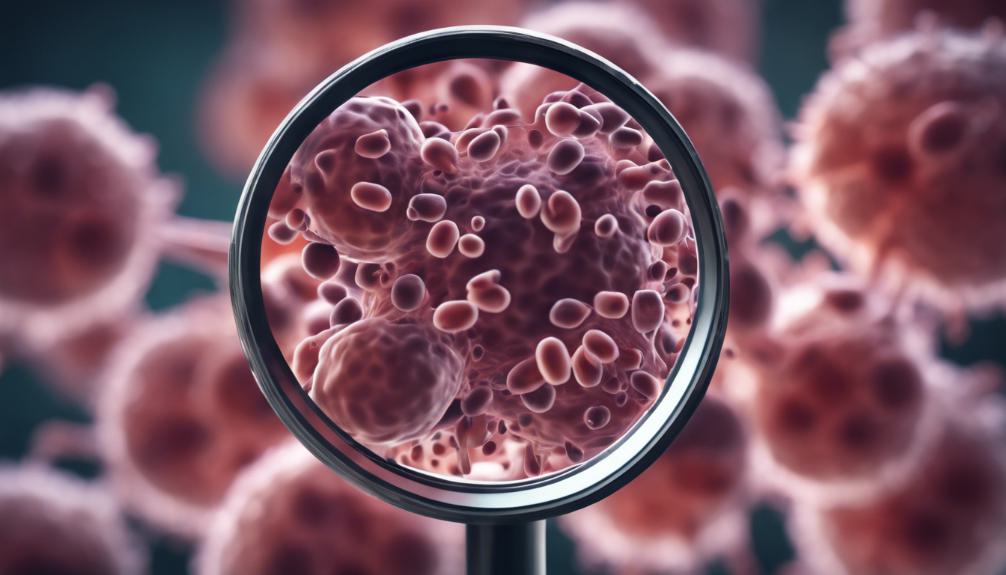Malt Lymphoma Lawsuit
Like a shadow that looms unseen until it's too late, the linkage between glyphosate exposure and MALT lymphoma has crept into the lives of countless individuals, casting a pall over their health and future. We've been following the unfolding narrative of lawsuits alleging that prolonged use of the popular herbicide Roundup is to blame for this rare form of cancer. As we navigate through the complexities of legal battles, scientific research, and personal stories, it becomes evident that this issue is not just about compensation; it's about justice, accountability, and the safety of future generations. Join us as we explore the significance of these lawsuits and what they could mean for the way we think about product safety and consumer rights.

Understanding MALT Lymphoma

Before diving deep into the lawsuit, it's crucial to grasp what MALT lymphoma is, a type of cancer that originates from the body's immune system tissues. This cancer specifically affects the mucosa-associated lymphoid tissue (MALT), which plays a significant role in defending our bodies against pathogens in mucosal areas, such as the stomach, intestines, and lungs.
We're looking at a condition that starts in the lymphocytes, a kind of white blood cell essential for our immune response. These cells, under normal circumstances, help protect us from infections. However, in MALT lymphoma, they begin to multiply uncontrollably, leading to cancer. What's particularly challenging about MALT lymphoma is its subtle onset. Symptoms can often be vague or mimic those of less severe illnesses, making early detection tricky.
Understanding the basics of MALT lymphoma is fundamental, especially when discussing legal actions related to it. It's not just about recognizing a disease by name but understanding its impact on individuals' lives. This knowledge allows us to appreciate the gravity of lawsuits associated with it and why individuals might seek justice.
The Role of Glyphosate

As we turn our attention to the role of glyphosate, it's crucial we understand its potential impact on our health. We'll explore how exposure to glyphosate could be linked to MALT lymphoma, and what legal actions have been taken against its use. This discussion aims to shed light on the controversies and concerns surrounding this widely used herbicide.
Glyphosate Exposure Risks
Understanding the risks associated with glyphosate exposure is crucial, as it's the active ingredient in many popular herbicides. We've seen a growing concern over how this chemical might affect our health, particularly when it comes to long-term exposure. It's widely used across agriculture, making its way into our food and water sources, leading us to question its safety.
Research has hinted at potential health implications, pushing us to consider safer alternatives and protective measures. We're becoming more vigilant about what we're exposed to and how it might impact our well-being. It's not just about avoiding direct contact; it's also about understanding the broader environmental and health implications of glyphosate's pervasive use. We're committed to staying informed and making choices that prioritize our health and the environment.
Linking Glyphosate to Malt
We've uncovered evidence suggesting that glyphosate may play a significant role in the development of malt lymphoma. Through extensive research, we've found that this chemical, widely used in herbicides like Roundup, could be linked to an increased risk of developing this particular type of cancer. Studies have shown that individuals with prolonged exposure to glyphosate have a higher likelihood of being diagnosed with malt lymphoma compared to those who've had limited or no contact. This correlation points to the urgent need for more in-depth investigation into how glyphosate interacts with our biological systems. Understanding this connection is crucial for protecting public health and could significantly impact how we approach the use of glyphosate in agricultural practices moving forward.
Legal Actions Against Glyphosate
The revelation that glyphosate may be linked to malt lymphoma has sparked a wave of legal challenges against its manufacturers. We're witnessing a significant moment where individuals and groups are stepping forward, armed with claims that prolonged exposure to this chemical has had devastating health impacts. It's not just about seeking compensation; it's a fight for accountability and to ensure safer practices in the future.
Courts are now battlegrounds where scientific evidence and personal testimonies converge, aiming to shine a light on the potential dangers of glyphosate. We're seeing a growing number of lawsuits, each echoing the concern that not enough was done to protect us from harm. Through these legal actions, we're not just seeking justice for those affected; we're pushing for a change that prioritizes public health over profit.
Legal Grounds for Claims

Frequently, plaintiffs in malt lymphoma lawsuits against Roundup argue that the manufacturer failed to adequately warn of the herbicide's potential cancer risks. We've seen cases where individuals, believing in the safety of the product, used Roundup for years, only to be diagnosed with malt lymphoma. The heart of these legal claims lies in what's known as failure to warn, a principle in product liability law. It's our position that if the manufacturer had provided clear and sufficient warnings about the potential health hazards, users could have made informed decisions about their exposure or taken additional precautions.
Moreover, we argue that the manufacturer might have known or should have known about the risks associated with their product. This knowledge creates a duty to inform the public and regulatory bodies, a duty we believe has been neglected. Our claims are not just about seeking compensation for those affected; they're about holding the manufacturer accountable for their actions and omissions. It's about ensuring that consumer safety is prioritized over profits, and that adequate warnings accompany products that pose potential health risks. This legal ground, we argue, is not only solid but necessary for the protection of public health.
The Science Behind the Allegations

Numerous scientific studies have linked the use of Roundup to an increased risk of developing malt lymphoma. It's not just one or two isolated findings; there's a growing body of research that suggests a strong correlation between Roundup exposure and this specific type of cancer. At the heart of these allegations is the active ingredient in Roundup, glyphosate, which has been under scrutiny for years.
We've delved into the scientific literature, and what we've found is compelling. Several studies have shown that glyphosate can cause damage to DNA, a precursor to cancer development. Furthermore, research indicates that the risk of developing malt lymphoma increases with the duration and intensity of Roundup exposure. It's a concerning connection that can't be ignored.
It's also important to understand that malt lymphoma is a relatively rare form of cancer, which makes the link to Roundup exposure all the more alarming. The fact that individuals with significant exposure to this herbicide are being diagnosed at higher rates than the general population can't be overlooked. We're committed to bringing these scientific findings to light, underscoring the need for accountability and safer practices.
Key Lawsuit Milestones

Having explored the scientific evidence linking Roundup to malt lymphoma, we'll now examine the key milestones in the lawsuit against its manufacturer.
The initial lawsuits were filed soon after the International Agency for Research on Cancer classified glyphosate, Roundup's active ingredient, as "probably carcinogenic to humans" in 2015. This classification set the stage for a multitude of personal injury and product liability cases against Monsanto, Roundup's manufacturer, now owned by Bayer.
One of the landmark moments came in 2018 when a California jury awarded a significant sum to a groundskeeper who alleged that Roundup caused his non-Hodgkin lymphoma. This verdict opened the floodgates for thousands of similar claims, compelling Bayer to propose a multi-billion dollar settlement in 2020 to resolve current and potential future lawsuits.
However, the legal battle didn't stop there. The settlement faced scrutiny and legal challenges, including from the U.S. Department of Justice, which questioned its fairness and adequacy. Amidst ongoing litigation, Bayer announced in 2021 plans to remove glyphosate from all residential lawn and garden products in the U.S. by 2023, a move seen as a direct response to the mounting legal and public pressure.
Victim Testimonials

Amid the legal turmoil, we've heard heart-wrenching testimonials from victims alleging that Roundup's glyphosate caused their malt lymphoma. These stories aren't just statistics or data points; they're vivid, personal accounts of pain, suffering, and, for some, the ultimate loss. We've listened as people recounted their shock and disbelief upon diagnosis, struggling to understand how a product they trusted for years could betray them so deeply.
Many shared how their lives were upended, from enduring rigorous treatment regimens to facing the uncertainty of their prognosis. The emotional toll, they've told us, is nearly as devastating as the physical one. Families spoke of the strain, watching loved ones battle a disease they believe was preventable, had they only been warned of the risks.
But it's not all despair. Amid the testimonials, there's also a thread of resilience. We've been inspired by stories of victims banding together, supporting each other through the darkest times. Their courage in speaking out, despite their vulnerabilities, keeps the spotlight on this issue, demanding accountability and safer practices for all.
Navigating the Legal Process

After hearing the poignant stories of those affected, we'll now explore how victims are taking legal action against the makers of Roundup.
Navigating the legal system can seem daunting, but we're determined to seek justice. Initially, we're gathering all necessary medical records and evidence linking our health issues to Roundup exposure. It's crucial to establish this connection to strengthen our case. We're also researching to choose the right legal representation; it's imperative we work with attorneys who've successfully handled similar lawsuits.
Once we've secured legal representation, they guide us through filing the lawsuit. This involves preparing legal documents that detail our claims and the damages we're seeking. Our lawyers have been transparent about the process, including potential timelines and the importance of patience, as these cases can take time to resolve.
Throughout this journey, we've learned the importance of standing together. There's strength in numbers, and as more people come forward, our collective voice becomes harder to ignore. We're committed to seeing this through, not just for ourselves, but for the countless others who've suffered in silence. It's a challenging path, but one we're willing to take for the sake of accountability and change.
The Impact on Families

We've seen firsthand how a diagnosis linked to Roundup can wreak havoc on a family, stretching beyond just the person affected. The emotional toll it takes on relatives is profound, as they grapple with fear and uncertainty. Meanwhile, the financial strain dynamics can alter a family's course, challenging their stability and future plans.
Emotional Toll on Relatives
The emotional toll on relatives, grappling with the harsh reality of a loved one's malt lymphoma diagnosis due to Roundup exposure, is often profound and far-reaching. We're thrown into a whirlwind of emotions, from anger and disbelief to a deep, pervasive sadness. It's not just the diagnosis itself but the implications it carries for our family's future. We find ourselves constantly worried, not only about the immediate health challenges but also about the quality of life and the potential loss we may face. The uncertainty is paralyzing, making it difficult to plan for the days ahead. Every phone call, every doctor's appointment feels like a potential turning point, for better or worse. It's a burden that we carry together, yet it also isolates us in our individual fears and anxieties.
Financial Strain Dynamics
Beyond the emotional turmoil, our family faces a daunting financial strain due to the costs associated with malt lymphoma treatment and care. Medical bills pile up, from chemotherapy sessions to countless doctor's visits, not to mention the hidden costs like travel for treatment and lost wages. It's a relentless cycle that drains our savings and pushes us towards difficult financial decisions. We've had to cut back drastically, prioritize expenses, and in some cases, borrow money or set up fundraisers to keep afloat. The financial burden adds an extra layer of stress to an already overwhelming situation. It's not just the patient who suffers; it's the whole family, struggling to cope with the financial fallout of a devastating diagnosis.
Seeking Compensation and Justice

Victims of malt lymphoma linked to Roundup are now stepping forward to seek compensation and justice through legal means. We're seeing a surge in individuals and families affected by this devastating diagnosis, rallying to hold the responsible parties accountable. It's not just about the financial compensation; it's about bringing to light the negligent actions that led to their suffering.
We're working closely with legal experts who specialize in product liability and personal injury lawsuits. They're guiding us through the complex legal landscape, ensuring that our claims are solid and backed with the necessary evidence. It's a daunting process, but we're determined to see it through.
Our goal is clear: we want to ensure that no one else has to go through what we've endured. By taking legal action, we're not just fighting for our own justice; we're advocating for change. We're pushing for stricter regulations and oversight, hoping to prevent future harm caused by negligent practices.
The journey ahead is long and fraught with challenges, but we're committed. Together, we're a powerful force, driven by our shared experiences and the desire for justice. It's time for accountability, and we're leading the charge.
Frequently Asked Questions
How Does a MALT Lymphoma Diagnosis Specifically Affect One's Day-To-Day Life and Ability to Work?**
We're wondering how a malt lymphoma diagnosis impacts daily life and work ability. It's tough, affecting energy levels, requiring frequent treatments, and sometimes making regular tasks and maintaining employment challenging for those affected.
This Question Seeks to Understand the Practical, Daily Implications of a MALT Lymphoma Diagnosis on an Individual's Routine and Employment Capabilities, Beyond the Medical and Legal Perspectives.
We're looking at how a malt lymphoma diagnosis disrupts daily life and work, focusing on the practical side of things. This goes beyond just the medical or legal issues, into the real-life challenges faced.
Are There Any Alternative Treatments or Therapies for MALT Lymphoma Not Commonly Discussed in Mainstream Medical Literature?**
We're curious about less-known treatments for malt lymphoma. Mainstream sources often overlook alternative therapies, and we're eager to explore all options that could help manage or potentially improve the condition beyond conventional methods.
This Question Inquires About Less Conventional Treatment Options for MALT Lymphoma That May Not Be Widely Known or Are Outside of Standard Medical Practices.
We're looking into lesser-known treatments for MALT lymphoma that aren't widely recognized or fall outside mainstream medicine. It's about exploring options beyond the conventional, possibly including holistic or experimental therapies.
How Have Recent Advancements in Medical Technology Impacted the Detection and Treatment of MALT Lymphoma?**
We've observed that recent medical technology advancements have significantly improved malt lymphoma detection and treatment. Enhanced imaging and targeted therapies are now more effective, offering patients better outcomes and reduced side effects.

This post has been generated by AI and was not reviewed by editors. This is Not legal advice. Please consult with an attorney.




